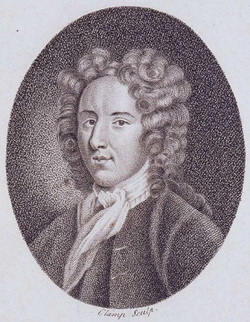George Farquhar

QUICK FACTS
Born: 1677 or 1678
Place of Birth: Londonderry, Ireland
Died: 1707 (died soon after March 8, buried May 23)
Father: William Farquhar, Protestant clergyman
Mother: unknown
Spouse: Margaret Pernell (married in 1703)
Education: Trinity College, Dublin, 1694-6
Dramatic Works: Love and a Bottle (produced 1697, published 1699), The Constant Couple, or A Trip to the Jubilee (prod. 1699, pub. 1700), Sir Harry Wildair (prod. and pub. 1701), The Inconstant, or The Way to Win Him (prod. and pub. 1702), The Twin-Rivals (prod. 1702, pub. 1703), The Stage-Coach (prod. 1703, pub. 1704), The Recruiting Officer (prod. and pub. 1706), The Beaux’ Stratagem (prod. and pub. 1707)
BIOGRAPHY*
Born to a Protestant clergyman in Londonderry, in Ireland, either in 1677 or 1678, George Farquhar remains something of a mysterious figure, for his life is known through a collection of questionable and oft-contrary accounts; existing details might therefore be well-taken with a few grains of salt. In 1694, Farquhar entered Dublin’s Trinity College, and although he managed by his second year to attain a scholarship, Farquhar apparently cared little for his studies. He left the college in 1696, and soon ventured into his theatrical career as a none-too-adept actor at Dublin’s Smock Alley theatre. Farquhar’s performances were reportedly weak, and he dropped this particular pursuit after wounding a fellow actor in a mock fight gone wrong. Yet Farquhar was far from finished with the theatre. However much Farquhar may have wanted acting prowess, the experience doubtless fostered a theatrical familiarity that proved useful in writing plays of his own. He departed for London soon after the accident—possibly upon the encouragement of actor Robert Wilks, for whom Farquhar would write several characters, including Archer in The Beaux’ Stratagem*—and the end of 1698 saw the production of Farquhar’s first play, Love and a Bottle, at London's Drury Lane. Though not a resounding success, Love and a Bottle stood tolerably, and Farquhar would find more certain popularity in 1699 with The Constant Couple. He continued to write for the theatre, penning a series of less successful plays and a host of prologues and epilogues for the works of others. Farquhar also forayed into the world of non-theatrical writing; 1702, for instance, saw the publication of his Love and Business, a collection that included the theatrically concerned “Discourse upon Comedy” and an assortment of poems and letters. Around 1703, Farquhar married the widow Margaret Pernell, taking on both her two children and her own dearth of funds. Having expected to gain a fair sum of money through the marriage, Farquhar found himself surprised by her poverty and pressed harder still for money. Soon after, he joined the military as a lieutenant and thus secured a solid (if insufficient) income by helping to recruit men and raise troops. His 1706 return to playwriting with The Recruiting Officer brought a highly successful debut and numerous successive productions, though even the money gained through such a triumph could not keep Farquhar from poverty. When he fell ill around the year's end, Farquhar likely found his future dim, and he was reportedly shaken from the torpor of illness only by Robert Wilks, who prompted Farquhar to write a play. Thus, in 1707, came the promptly popular Beaux’ Stratagem. Farquhar himself had reached the proverbial end of the line, and died even as The Beaux’ Stratagem enjoyed a resoundingly positive reception. The exact date of Farquhar’s death is unknown, though Rothstein’s suggested range of May 18th and 21st (based on Farquhar’s May 23rd burial) seems apt. Whatever the exact date of death, Farquhar had made his mark, and productions of The Beaux’ Stratagem and his other works would continue for years (and further years, and further years) to come.
*Most of the information here has been taken from Rothstein’s 1967 book on Farquhar and from Cordner’s introduction to the 1990 New Mermaids edition of The Beaux’ Stratagem (Cordner himself relies primarily on Rothstein), and checked against briefer, more recent sketches of Farquhar.
**See Milhouse and Hume's "Production Analysis" for more on roles and the actors and actresses for whom they were apparently written.
WORDS REGARDING FARQUHAR
Remarks from Farquhar: Excerpts from works beyond The Beaux' Stratagem.
Remarks on Farquhar: Quotes on the dramatist and his work, taken from sources from the eighteenth century to the twentieth.
FURTHER FARQUHAR
"About Farquhar," Akiva Fox (from the Shakespeare Theatre Company's site). For another biographical take.
"George Farquhar's Military Career," Robert John Jordan, published in Hunting Library Quarterly (available through JSTOR). For an in-depth consideration of Farquhar's service.
